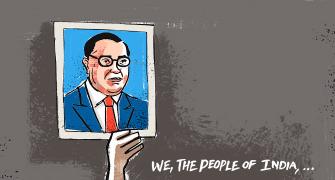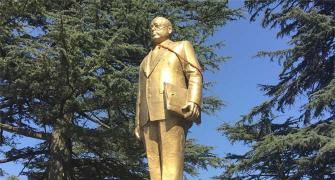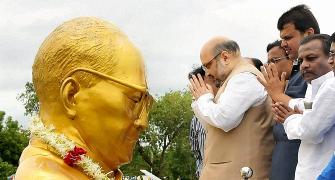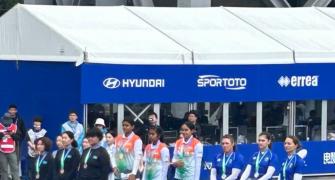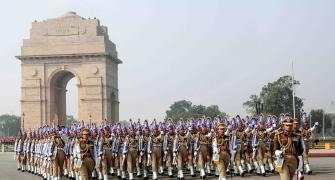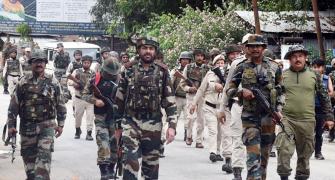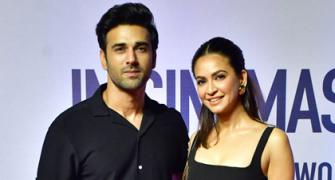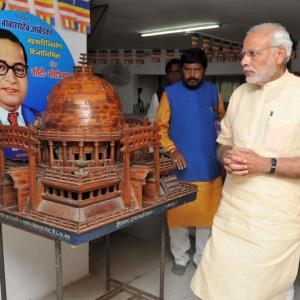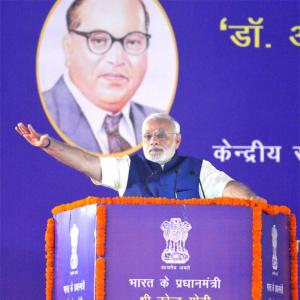'For no other leader of India do so many people turn up for an event every year without invitation.'

As a child, Somnath Waghmare would travel to Chaityabhumi in the north central Mumbai area of Dadar, the cremation site of the architect of India's Constitution, Dr Babasaheb Ambedkar, to pay homage to him on his death anniversary on December 6.
Little did he realise then that this experience would be so moving that he would grow up to make a documentary movie on the same subject.
Last month, his documentary Chaityabhumi was released and last week he achieved a milestone after he was called to London for the screening of his documentary at the London School of Economics, Kings College London, Cambridge University and Oxford University.
Waghmare spoke to Syed Firdaus Ashraf/Rediff.com on his documentary, the portrayal of Dalits in Bollywood and the importance of Chaityabhumi in the lives of Dalits.
Your documentary is getting international recognition even though it has not completed a month since its release.
I don't have any public relations department to promote my film. Every film-maker has his or her own network to promote their films as they come from a privileged background, but that is not so in my case.
Everyone knows my family background. I come from a family which never had resources (for me to become a film-maker). And therefore you feel happy when the London School of Economics acknowledges your work.
They called me to London and interviewed me about my film. It is a great feeling. I started from zero and it is a good feeling to reach on the international level.
When did you start this film?
I started to film before the pandemic in 2019 and it was completed in August 2023. It was released in October this year.
What kind of research did you do for the documentary?
I always do a lot of research before starting any film.
I am doing my PhD from TISS, Mumbai, and I feel researching a subject for a film is very essential to the making of a film.
I met a lot of people for this film, like journalists and old activists, to gather information. After which I decide what to shoot and what not to shoot for my documentary.
Research always makes any film a very good film.
Why did you choose this subject?
I did so because our films do not represent or portray a big section of our society, and that is the Dalit society.

Bollywood portrays the life of a few rich individuals of society and they feel this is the story of every Indian, but that is not the fact.
And even if they showcase Dalit issues they show it in a very insensitive manner.
Take, for example, Lagaan with Aamir Khan directed by Ashutosh Gowariker. In that movie they kept the name of a Dalit character as Kachra (garbage). Now just see how humiliating and insulting it could be for Dalit society. And for doing so they do not have any guilt or shame.
Lagaan was set in British India and therefore portrayed the society of those days, isn't it?
It was not a real story, so why portray a Dalit character as Kachra? This is pure casteism and the casteist feeling that you have in your mind about your supremacy comes out in your film-making.
You are representing Dalits as victims as in Anubhav Sinha's Article 15. Dalit lives are not restricted to manual scavenging and atrocities, they have a huge cultural aspect to their lives which I explore through this Chaityabhumi documentary of mine.
You cannot call Lagaan casteist because in my opinion it portrays unity among Indians before Independence that is fostered through a cricket match and defeating the British.
Yes, the film-maker did so through his Brahminical ideas.
But why name a Dalit as kachra?
In Swades, Ashutosh did not feel like giving Shah Rukh Khan's character's name as Kachra Bhargav, but gave him the name Mohan Bhargav.
And therefore my observation has been that Bollywood is a super casteist industry against Dalits. They have ignored Dr Ambedkar's cultural legacy which is happening right here in Mumbai every year at Chaityabhumi by not telling a single story. Therefore, I made the film.
We had Sairat in Marathi which spoke about casteism and this was made in Hindi too as Dhadak.
Sairat was made by a Dalit, Nagraj Manjule. And when the Dalit community makes a film about Dalit issues they make a good film.
Maybe upper caste Bollywood personalities as you call them, do not have that vision about Dalit society.
If that is the case, why make films representing Dalits in a demeaning way? Don't make films on them. You be happy to make rich happy family stories which you know.
Does it mean that Bollywood is controlled by a privileged community who ignore marginalised communities when it comes to making films on their lives?
Privilege means the ones who have family capital with them. Their parents have bungalows, land and are English educated. This we call as social capital.
Film-making is an expensive business and who has the money to make films? It is these people who have money and they come from a rich background.
They are the same ones who make documentary films, too. They have controlled the film business and do not allow outsiders from other castes to enter their fiefdom, and even if the outsiders try hard they try to suppress them.
Is it true for regional cinema too, where we had a Tamil film like Jai Bhim?
Regional cinema is India's mainstream cinema. Tamil cinema or even Marathi cinema is not regional cinema, but mainstream cinema. It is this cinema that is recognised globally.

Chaityabhumi was screened at Oxford University and it is not a Bollywood film that will be screened over there. Bollywood makes film for rich people and it is not mainstream cinema.
We do have changes in Bollywood too as we had a Patal Lok which gave a very good representation of Dalits in India.
It was not a Bollywood movie. It was for OTT platform and a web series.
What is the importance of Chaityabhumi and why is it so dear to Dalits today?
The congregation of Dalits at Chaityabhumi in the central Mumbai area of Dadar has been represented wrongly in the media. This is especially true for the English media which created hatred for Dalits.
For the last five years they are not writing against the gathering of Dalits at Chaityabhumi, but earlier they have been constantly writing about traffic jams on December 6.
Traffic jams was the priority of the English media on December 6.
The English media never felt the urge to know how one of the great leaders Dr Babasaheb Ambedkar's followers assemble peacefully at Chaityabhumi and leave peacefully after paying their homage.
The English media never bothered to know why so many books sell on this day at Chaityabhumi. Why so many people come without an invitation.
For no other leader of India do so many people turn up for an event every year without invitation.
This is not the case restricted to India, but is true across the world. Nowhere in the world will you get an example where 20 lakh people turn up every year to pay homage to their leader.
The only exception is Dr Babasaheb Ambedkar.
Now the question is why do they come? Nobody turns up even for Mahatma Gandhi's memory.
It is because Dr Ambedkar's contribution is bigger than that of Gandhi. This is my opinion, though, and I am not saying you have to agree with me.
Dr Ambedkar is a global figure. I was at the London School of Economics and they have only one statue of an Indian leader, and that is of Dr Ambedkar.
The liberals of India tried to suppress his popularity for very long, but they could not succeed in their endeavour.
What is the kind of energy or inspiration that Dalits get when they come to Chaityabhumi every year? And what does your documentary say about this?
You have to watch my documentary to know the answer to your question.
Why have we failed to achieve a casteless society in India even 75 years after Independence?
This question should be put to the dominant castes and not a Dalit like me.
Caste privilege is for the upper castes and not Dalits. The upper castes benefit more from the caste system, so it is their responsibility to answer such questions.
Can you share your own personal journey to Chaityabhumi?
I am a Maharashtrian Dalit by birth and visiting the Chaityabhumi as well as Deeekshabhumi (in Nagpur, where Dr Ambedkar embraced Buddhism) is very important to our lives.
I did visit Chaityabhumi as a child and it was a very good feeling to see that our community is so big in numbers.
The second feeling you get is that our cultural heritage is very strong.
Third, India's largest book festival is held at Shivaji Park close to Chaityabhumi every year on December 6. It is 10 times bigger than the Jaipur Literature Festival. People buy books and Chaityabhumi on December 6 becomes a place where there is a great exchange of knowledge.
Books are very important to human life and my first interaction with books as a child was at Chaityabhumi.

